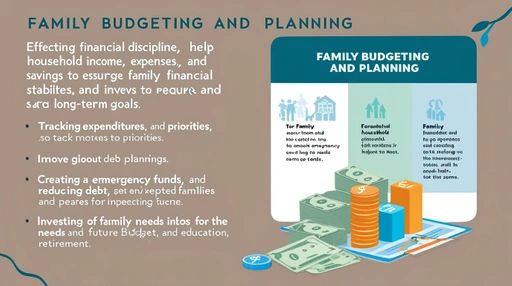Family budgeting and planning are critical aspects of household management that ensure financial stability and future security. A well-structured family budget not only helps in managing daily expenses but also plays a pivotal role in achieving long-term goals, preparing for emergencies, and fostering financial discipline among family members. With the rising cost of living and economic uncertainties, the importance of effective budgeting has grown significantly, prompting families to adopt systematic approaches to handle their finances efficiently.
The first step in family budgeting is assessing income and expenses. It involves identifying all sources of income, including salaries, bonuses, rental income, and other inflows. Simultaneously, families must track their expenses to determine where their money is spent. Categorizing expenses into fixed, variable, and discretionary costs helps in gaining clarity. Fixed expenses typically include rent, mortgage payments, insurance premiums, and utility bills, while variable expenses cover groceries, transportation, and medical bills. Discretionary expenses involve non-essential spending, such as dining out, entertainment, and vacations. Understanding these categories allows families to evaluate their spending patterns and identify areas where savings can be made.
Setting financial goals is another essential component of family budgeting. Goals may include saving for children’s education, purchasing a home, retirement planning, or establishing an emergency fund. Short-term goals can focus on immediate needs like paying off debts, while long-term goals require careful investment strategies. Effective goal setting involves prioritizing these objectives based on their urgency and feasibility. Families should ensure that their goals are specific, measurable, attainable, relevant, and time-bound (SMART), which helps in tracking progress and maintaining motivation.
Developing a budget plan is the next crucial step. A practical budget allocates specific amounts for each category of expenses based on past spending habits and future goals. Many families use budgeting tools and software to simplify this process, enabling them to track expenditures and monitor savings. It is also essential to review and adjust the budget regularly to accommodate changes in income, expenses, or financial priorities. Flexibility in budgeting ensures that families can handle unexpected financial demands without compromising their long-term objectives.
Savings and investments play a fundamental role in family budgeting and planning. Allocating a portion of income toward savings creates a financial cushion for emergencies, reducing reliance on credit and loans. Emergency funds should ideally cover three to six months’ worth of expenses, providing security during job losses or medical crises. Investment options such as mutual funds, stocks, bonds, and retirement accounts offer opportunities for wealth accumulation. Families should seek professional advice to select investment avenues that align with their risk tolerance and goals. Diversifying investments minimizes risks and ensures steady growth over time.
Debt management is another integral aspect of family budgeting. Many families struggle with debt due to mortgages, car loans, credit cards, and personal loans. Effective budgeting helps in prioritizing debt repayment by focusing on high-interest debts first. Strategies such as debt consolidation and refinancing can also reduce the financial burden. Establishing a repayment plan with fixed monthly installments enables families to clear debts systematically, improving their credit scores and financial stability.
Teaching financial literacy to all family members, including children, strengthens the foundation of budgeting and planning. Children should be educated about money management, saving, and the value of delayed gratification. Providing allowances and encouraging children to save for specific goals instills financial responsibility from a young age. Parents can also involve teenagers in discussions about household expenses and savings strategies, preparing them to handle their finances independently in the future.

Technology has revolutionized family budgeting by offering tools that simplify financial management. Mobile applications, spreadsheets, and online platforms provide real-time tracking, automated savings, and expense categorization. These tools not only save time but also enhance accuracy and accountability. Families can set reminders for bill payments, track subscriptions, and generate reports to assess financial performance. The integration of technology into budgeting practices has made it easier for families to stay organized and focused on their goals.
Despite careful planning, families often face financial challenges that test their budgeting skills. Sudden medical emergencies, job losses, or unexpected repairs can disrupt financial stability. Having an emergency fund and adequate insurance coverage mitigates these risks. Families should also evaluate their insurance policies, including health, life, and property insurance, to ensure comprehensive protection against unforeseen events. Regular financial reviews help in identifying gaps and implementing necessary adjustments to maintain resilience.
Cultural and social factors also influence family budgeting and planning. Celebrations, weddings, and festivals often entail significant expenses, requiring careful planning to avoid overspending. Families can manage such events within their budgets by prioritizing expenses, negotiating deals, and seeking cost-effective alternatives. Similarly, vacations and leisure activities should be planned well in advance to take advantage of discounts and special offers. Maintaining a balance between enjoyment and savings ensures that families can create memorable experiences without compromising financial stability.
Retirement planning is a long-term objective that requires disciplined savings and investments. Families should start saving early to benefit from compound interest and tax advantages offered by retirement accounts. Contributions to pension plans, employer-sponsored retirement funds, and individual retirement accounts provide financial security during old age. Periodic evaluations of retirement plans and adjustments based on inflation and lifestyle changes help families stay on track toward achieving their retirement goals.
Effective communication among family members is vital for successful budgeting and planning. Open discussions about financial goals, expectations, and constraints foster transparency and cooperation. Couples should work together to align their priorities, resolve conflicts, and make informed decisions. Regular family meetings can be scheduled to review budgets, discuss challenges, and celebrate achievements, reinforcing the importance of teamwork in financial management.
In conclusion, family budgeting and planning are indispensable for achieving financial stability and long-term prosperity. By assessing income and expenses, setting clear goals, developing a flexible budget, prioritizing savings, managing debts, and leveraging technology, families can build a secure financial future. Teaching financial literacy, preparing for emergencies, and maintaining effective communication further strengthen the foundation of financial management. While challenges may arise, proactive planning and disciplined execution empower families to overcome obstacles and achieve their dreams. Ultimately, a well-organized budget transforms financial aspirations into reality, ensuring peace of mind and a better quality of life for every family member.

8 thoughts on “Family Budgeting and Planning”
Comments are closed.